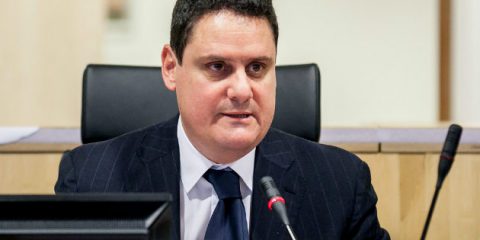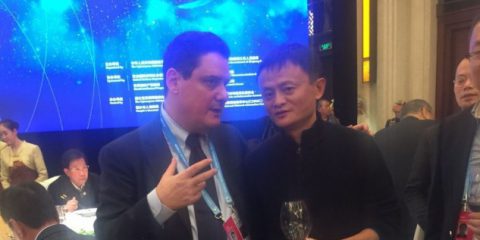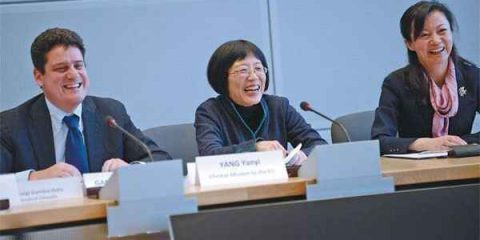Europa

Testo integrale della lettera scritta da Luigi Gambardella, presidente di EUBrasil, indirizzata al vice presidente della Commssione europea, Antonio Tajani.
“Dear Commissioner,
during the VI EU-Brazil Summit held in Brasília on 24 January 2013, President Barroso and President Dilma Rousseff agreed to establish an Ad-Hoc Working-Group to analyze more systematically bilateral economic issues including competitiveness and investment.
In conjunction with this working-group, your mission to Brazil scheduled for the beginning of October would be a great opportunity to enhance the cooperation and to coordinate joint activities.
Therefore, as President of EUBrasil, an association created with the aim of supporting the development of business relations between the European Union and Brazil, I would like to present to you a few important issues that our association has identified.
President Dilma, in her trip to France, acknowledged that the biggest challenge for Brazil’s growth today is to re-establish economic competitiveness. This means tackling, finally, the famous “Custo Brasil”: lack of infrastructures, insufficient education, a jungle of fiscal regulation, bureaucratic barriers to business, etc. All these problems need huge investments.
On the EU side, two weeks ago, President Barroso in his State of the Union speech acknowledged that a lot has been done to fight the current crisis, but more efforts are needed, because for the EU, the recovery is still only within sight.
Both Brazil and the EU have their share of problems to tackle. Brazil has a number of structural problems which it is failing to address adequately. Notwithstanding a booming consumer market, entrepreneurs are less confident about future growth prospects, this has translated into weaker private investment (4,5% lower in 2012 compared to 2011 and representing an amount lower than 18% of GDP). The EU has to restore the confidence of its citizens and to build stronger foundations to assure a sound recovery: restoring normal lending to the economy, notably to SMEs as credit is not yet sufficiently flowing to the economy across the euro area; solving an employment maze, especially for the younger; and fixing budget distortions that still result in large deficits.
Like the EU, Brazil is undertaking reforms that aim to break the stagnation of its economy. But both economies find themselves in a vicious cycle: less investment, less growth, more public-backed credit, more consumer indebtedness, more public deficits, less trust in the future of the economy and again less investment.
But this has a silver lining, engaging in similar reforms may create additional opportunities for the EU-Brazil economic relationship.
The Brazilian authorities are trying to launch big competitiveness programs, particularly in infrastructure, but the results of these efforts will take time. In the meantime, Brazil is betting on a boost that would come from the Soccer World Cup in 2014 and the Olympic Games in 2016. They are also favouring more business-friendly PPPs in order to tap the indispensable private investment. There are also worries deriving from Chinese industrial competition. So there are huge opportunities for common cooperation on world trade, enhancing the opportunity for European firms to invest in Brazil and vice versa. The EU should foster a policy to attract and facilitate Brazilian investment in Europe as a way to capture the need of Brazilian firms to internationalize as a way to be better prepared for the future.
There is a widespread expectation that there is no possibility of arriving, in the foreseeable future, at an EU-MERCOSUR agreement; negotiations are stuck since 2004. But in order to foster a new more competitive growth model, Brazil needs more access to foreign markets (and the EU is its most important customer market) and needs to open up much more its own market if it wants to enhance its firm’s competitiveness.
There are two possible parallel paths to unlock the current situation. The first is to go ahead with a set of bilateral EU-Brazil agreements on “anything but trade”: rules, standards, SPS, investment, taxation, regulations, business facilitation, the whole arsenal of technical barriers to trade and non-tariff barriers to trade. This can be done without endangering MERCOSUR and would strengthen the Brazilian hand in promoting the second path: the sequencing of the bi-regional talks. MERCOSUR would be kept as a negotiating umbrella under which each member country could adopt faster or much slower liberalization commitments and schedules. The EU has already experienced this kind of solution in its negotiations with the Andean Community.
The Brazilian economy is at a crossroads. So is the European one. A deeper relationship between both partners may prove critical to achieve success.
We hope that these thoughts could be of help in preparing your mission, to increase the business content of the Strategic Partnership and to foster bilateral economic cooperation“.











